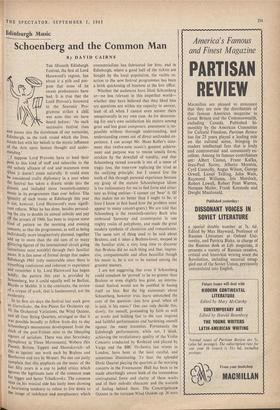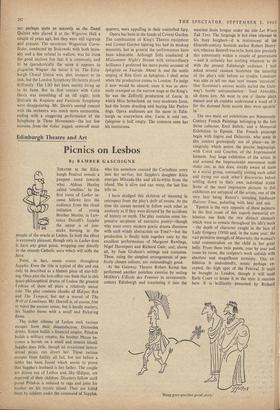Edinburgh Music
Schoenberg and the Common Man
By DAVID CAIRNS
THE fifteenth Edinburgh Festival, the first of Lord Harewood's regime, has fir Loid Provost's foreword recent predecessors have had. It is true that the pose that none ' of its about it a pith and pur- pose to the Souvenir Pro- gramme strikes a chill wet note that we have heard before; `As each successive festival rises and passes into the storehouse of our memories, Edinburgh, as the rock round which she lives, stands fast with her beliefs in the mystic influence of the Arts upon human thought and under- standing.'
It suppose Lord Provosts have to lend their Pens to this kind of stuff and subscribe to the old unholy alliance of cod and mammon even when it doesn't come naturally. It could even be considered crafty diplomacy in a year when the festival has taken a drastic stride into the present and included more twentieth-century music in its programmes than ever before. The quantity of such music at Edinburgh this year is not, however, Lord Harewood's most signifi- cant reform. What he has done, besides persuad- ing the city to double its annual subsidy and pay oil the arrears of 1960, has been to impose some kind of pattern on the morning and evening Concerts, so that the programmes, as well as being individually more imaginatively planned, together add up to more than the old sum of so many glittering figures of the international circuit going (sometimes most notably) through their familiar Paces. It is this sense of formal design that makes Edinburgh 1961 truly memorable since there is something continuous and coherent to experience and remember it by. Lord Harewood has begun boldly; the pattern this year is provided by Schoenberg, but it could equally well be Berlioz, Haydn or Mahler. It is the continuity, the review of a corpus of work, that is fundamental, not the modernity.
In its first six days the festival last week gave Us Gurrelieder, the five Pieces for Orchestra op. 10, the Orchestral Variations, the Wind Quintet, and all four String Quartets, arranged so that it was possible broadly to follow from day to day Schoenberg's momentous development from the thick of the post-Tristan mire to the liberating rigours of serialism. There was also Stravinsky (Symphony in Three Movements), Webern (Six Pieces), Britten, Tippett and Shostakovich—all this as against one work each by Brahms and Beethoven and two by Mozart. No one can justly enmplain that this emphasis on the music of the last fifty years is a sop to jaded critics which ignores the legitimate taste of the common man for bigger and better Tchaikovsky. The common man on his musical side has lately been showing a heartening tendency to refuse to live down to the image of indolence and complacency which commercialism has fabricated for him; and in Edinburgh, where a good half of the tickets are bought by the local population, the visible re- action to the new festival programmes has been a brisk quickening of business at the box office.
Whether the audiences have liked Schoenberg or—no less relevant in this imperfect world— whether they have believed that they liked him are questions not within my capacity to answer, least of all when I cannot even answer them unequivocally in my own case. As for determin- ing for one's own satisfaction his stature among great and less great composers, assessment is im- possible without thorough understanding, and understanding comes out of direct unclouded ex- perience. I can accept Mr. Hans Keller's state- ment that twelve-note music's greatest achieve- ment and purpose was to rescue sonata form, stricken by the downfall of tonality, and that Schoenberg turned towards it out of a sense of tragic loss, the tone-row replacing the triad as the unifying principle; but I cannot live the truth of this through personal experience because my grasp of the mature Schoenbergian idiom is too rudimentary for me to feel form and struc- ture as living entities—I cannot yet 'hear' it. (If this makes me no better than I ought to be, at least I know at first hand how the problem must appear to many concert-goers.) We are told that Schoenberg is the twentieth-century Bach who embraced harmony and counterpoint in one mighty realm of polyphony, and made the great modern synthesis of classicism and romanticism. The same sort of thing used to be said about Brahms; and it takes a Brahms-lover, steeped in the familiar style, a very long time to discover that Brahms did no such thing and that, impres- sive, companionable and often beautiful though his music is, he is not to be named among the greatest masters.
I am not suggesting that even if Schoenberg could somehow be 'proved' to be no greater than Brahms or even slightly less great, an interna- tional festival would not be justified in basing itself on him. But the big statements about Schoenberg, however true, leave untouched the core of the question—just how good, when all is said, is his music? One can only decide this, slowly, for oneself, proceeding by faith as well as works and holding fast to the rare inspired and faithful performances and hardening oneself against the many travesties. Fortunately the Edinburgh performances, while not, I think, achieving the revelationary quality of the Violin Concerto conducted by Rosbaud and played by Varga and the BBC Orchestra last winter in London, have been at the least careful, and sometimes illuminating. To hear the splendid Drolc Quartet playing the quartets at the morning concerts in the Freemasons' Hall has been to be made absorbingly aware both of the tremendous contrapuntal force and clarity of these works and of their melodic character and the warmth of feeling behind them. The Concertgebouw Quintet in the intricate Wind Quintet op. 26 were not perhaps quite so masterly as the Danz' Quintet who played it at the Wigmore Hall a couple of years ago, but they were still vigorous and piquant. The enormous Wagnerian Gurre- lieder, conducted by Stokowski with both inten- sity and a fine refusal to wallow, was far from the good unclean fun that it is commonly said to be (paradoxically the more it appears to plagiarise Wagner the better it is). The Edin- burgh Choral Union was, alas, unequal to its task, but the London Symphony Orchestra played brilliantly. The LSO has been mainly living up to its fame. But its first concert with Colin Davis was something of an off night; both Sinfonia da Requiem and Fantastic Symphony were disappointing. Mr. Davis's second concert with the orchestra was much more memorable, ending with a staggering performance of the Symphony in Three Movements—the last few minutes, from the violas' jagged, sawn-off semi- quavers, were appalling in their controlled fury.
Opera has been in the hands of Covent Garden. The combination of King's Theatre equipment and Covent Garden lighting has had its madcap moments, but in general the performances have been admirable. Although Solti conducted A Midsummer Night's Dream with extraordinary brilliance I preferred his more poetic account of I phigdnie en Tauride. About it, and the noble singing of Rita Gorr as 1phigdnie, I shall write when the production comes to London. To judge it now would be absurd, since it was so obvi- ously cramped on the narrow stage at the King's. So was the Zeffirelli production of Lucia, in which Miss Sutherland, on very moderate form, had the house drooling and baying like Pavlov dogs. Opera audiences are the same in Edin- burgh as everywhere else; Lucia is sold out, 1 phigdnie is half empty. The common man has his limitations.



































 Previous page
Previous page